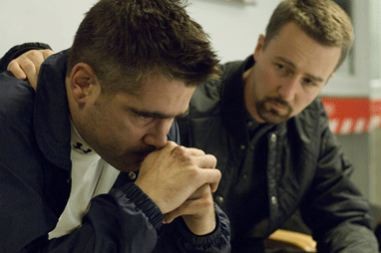Pride and Glory

A movie about a family of Irish cops—that sounds like one you’ve seen before. But Pride and Glory contains a few unfamiliar notes, and it rings truer than most movies about corruption in the police ranks.
When four New York cops from one precinct are caught in a trap and picked off by drug dealers, Francis Tierney Sr. (Jon Voight), a senior officer, persuades his son Ray (Edward Norton), a first-rate detective who’s left active duty for a job in the missing persons bureau, to help solve the crime. Ray’s older brother Frank (Noah Emmerich) is the captain of the precinct, and Jimmy Egan (Colin Farrell), who’s married to their sister Megan (Lake Bell), works under him. Ray has a past—not revealed until late in the film—that explains both his reluctance to return to the streets and his insistence on pursuing evidence that the dead officers were set up by dirty cops in the same precinct house.
At the beginning, the stock dialogue—every line punctuated by the same well-known obscenity—feels like a low-grade fever. But then a mournful mood begins to take hold, and so does the acting. Director Gavin O’Connor has no skill for action sequences (luckily there are few), and he doesn’t provide much tonal variety, a flaw inherent in the script he wrote with Joe Carnahan. But he is no lightweight when it comes to directing actors. O’Connor’s most recent movie was Miracle, which showcased a beautiful performance by Kurt Russell as Herb Brooks, the coach who led the 1980 U.S. Olympic hockey team to an improbable gold medal, and in which the whole acting ensemble was effortlessly convincing. It was a small movie, but one that didn’t take many false steps.
Pride and Glory is built around Norton’s peerless low-key performance. He’s hunched so deep inside the character that the smallest squint or pause seems to unveil a complex system of motivation and behavior. But the whole cast is in sync with the material and with each other. Voight, playing an alcoholic whose imbibing is a given rather than a plot point (that’s a plus for the screenplay), illuminates both the up and the down sides of Francis Sr.’s old-school attitudes. The normally bland Emmerich rises to his role as a decent cop who wouldn’t take a bribe if his life depended on it but has developed a tolerance for those who do. And as one of the cops involved in the killings, the gifted character actor John Ortiz, whose performance was one of the few high spots in last year’s American Gangster, has a remarkable, go-for-broke scene in which he’s flayed by his own conscience.
The dialogue may be standard, but in their storytelling Carnahan and O’Connor show a sensitivity to the complexities of human behavior that make the characters compelling (the main exception being Colin Farrell as Jimmy, who is stuck with the least developed role—the bad cop who doesn’t shy away from the ugliest kinds of brutality).
It’s a shame the film doesn’t develop the women: Megan, who suspects what Jimmy’s into but keeps it to herself; Abby (Jennifer Ehle), Frank’s wife; and Maureen (Leslie Denniston), the mother of the family. Ehle is a talented actress, but her character is defined by the cancer that’s eating away at her, a subplot that adds more weight to the film than it needs. Denniston has a lovely moment with Voight when she slides a glass of whiskey out of his hands without making a big deal out of it. Her deft, practiced handling of his drinking makes us want to see more about how this couple interacts—but that’s all we get.
The climax is overwrought; it’s the first time in the movie that you feel O’Connor is overplaying his hand. But the messy interactions of the members of this family, which can’t be resolved in satisfying ways, get to you. “This isn’t going to go how you want it to,” Ray tells the internal-affairs cops when he’s asked to give his testimony. The movie’s determination to stay true to the characters makes something piercing and memorable out of this tale—it’s one that you only think you’ve seen before.





